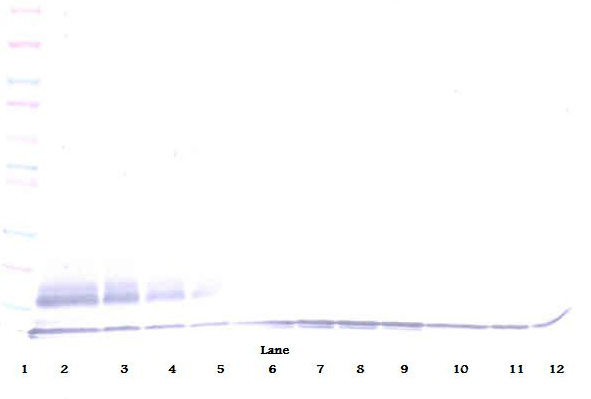MDC (CCL22) Rabbit Polyclonal Antibody
Specifications
| Product Data | |
| Applications | ELISA, WB |
| Recommended Dilution | Sandwich ELISA: To detect Human MDC by direct ELISA (using 100 µl/well antibody solution) a concentration of at least 0.5 µg/ml of this antibody is required. This antigen affinity purified antibody, in conjunction with Biotin conjugated Anti-Human MDC (Cat.-No PP1049B1 or PP1049B2) as a Detection antibody, allows the detection of of 0.2-0.4 ng/well of recombinant Human MDC. Western Blot: To detect Human MDC by Western Blot analysis this antibody can be used at a concentration of 0.1- 0.2 µg/ml. Used in conjunction with compatible secondary reagents the detection limit for recombinant hMDC is 1.5-3.0 ng/lane, under either reducing or non-reducing conditions. |
| Reactivities | Human |
| Host | Rabbit |
| Clonality | Polyclonal |
| Immunogen | Highly pure (>98%), E.coli derived recombinant Human MDC (Cat.-No PA104) |
| Specificity | Recognizes Human Macrophage Derived Chemokine (MDC, CCL22). Other species not tested. |
| Formulation | PBS, pH 7.2 without preservatives. State: Aff - Purified State: Lyophilized (Sterile filtered) purified Ig fraction |
| Reconstitution Method | Restore in sterile water to a concentration of 0.1-1.0 mg/ml. |
| Purification | Affinity Chromatography employing an immobilized Human MDC matrix. |
| Storage | Store lyophilized at 2-8°C for 6 months or at -20°C long term. After reconstitution store the antibody undiluted at 2-8°C for one month or (in aliquots) at -20°C long term. Avoid repeated freezing and thawing. |
| Stability | Shelf life: one year from despatch. |
| Database Link | |
| Background | The MDC gene is one of several Cys-Cys (CC) cytokine genes which are clustered on the q arm of chromosome 16. Cytokines are a family of secreted proteins involved in immunoregulatory and inflammatory processes. The CC cytokines are proteins characterized by two adjacent cysteines. The cytokine encoded by MDC displays chemotactic activity for natural killer cells, chronically activated T lymphocytes, monocytes and dendritic cells. It has no chemoattractant activity for eosinophils, neutrophils and resting T lymphocytes and also displays a mild activity for primary activated T lymphocytes. The product of this gene binds to chemokine receptor CCR4. This chemokine may play a role in the trafficking of activated T lymphocytes to inflammatory sites and other aspects of activated T lymphocyte physiology. |
| Synonyms | SCYA22, CC chemokine STCP-1 |
| Note | Centrifuge vial prior to opening! |
| Reference Data | |
Documents
| Product Manuals |
| FAQs |
{0} Product Review(s)
0 Product Review(s)
Submit review
Be the first one to submit a review
Product Citations
*Delivery time may vary from web posted schedule. Occasional delays may occur due to unforeseen
complexities in the preparation of your product. International customers may expect an additional 1-2 weeks
in shipping.






























































































































































































































































 Germany
Germany
 Japan
Japan
 United Kingdom
United Kingdom
 China
China





